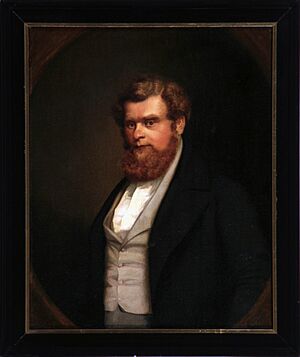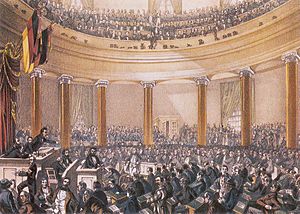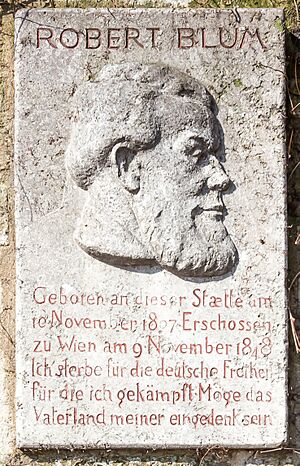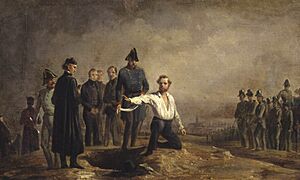Robert Blum facts for kids
Quick facts for kids
Robert Blum
|
|
|---|---|

Painting by August Hunger of Robert Blum between 1845 and 1848
|
|
| Personal details | |
| Born | 10 November 1807 Cologne |
| Died | 9 November 1848 (aged 41) Brigittenau, Vienna, Austrian Empire |
| Resting place | Jewish cemetery in Währing |
| Citizenship | Prussian |
| Nationality | German |
| Spouse |
Jenny Blum
(m. 1840) |
| Children | Hans Blum |
| Parents |
|
| Occupation | Librarian, Politician, Writer, Revolutionary |
Robert Blum (born November 10, 1807 – died November 9, 1848) was an important German politician, writer, and revolutionary. He was a member of the National Assembly in 1848. This was a special meeting where people tried to create a unified and democratic Germany.
Blum strongly believed that all people should be equal. He wanted a strong, united Germany where no one group ruled over another. He was against the idea of Prussia controlling Poland. He also supported equal rights for men and women. He was even against unfair treatment of Jewish people. Robert Blum was arrested in Vienna and executed because of his role in the Revolutions of 1848 in the German states. His death became a symbol for the fight for freedom in Germany.
Contents
Robert Blum's Early Life and Education
Robert Blum grew up in Cologne, a city in Germany. His family was very poor. His father was a cooper, which is someone who makes barrels. Robert was ten years old before he could even go to school.
After school, he tried different jobs. He worked as a craftsman, but he didn't do well as a goldsmith's apprentice. However, he finished training to become a gardener. Later, he worked in a lamp factory in Cologne. Because he was good with numbers, his boss put him in charge of the sales counter.
In 1829, Blum moved to Berlin with his employer. He continued his education there. His work was stopped when he had to serve in the military. After his military service, he was still poor, so he went back to Cologne. In 1830, he worked for a theater company and started writing poems and plays about politics. When the theater closed, he worked as a writer for a sheriff.
Becoming a Political Voice
The big political changes happening in 1830 made Robert Blum very interested. Ideas about freedom and rights began to appear in his poetry. In 1832, he moved to Leipzig with the theater group.
In Leipzig, he met people who believed in human rights and freedom. He wrote for a liberal newspaper called Zeitung für die elegante Welt. He also joined a freemason group, which was a kind of club where people discussed ideas. By 1840, he had become a cashier at the city theater.
That same year, he started the Schillerverein in Leipzig. This group celebrated the poet Schiller's birthday. But it was also a way to celebrate political freedom.
Leading the Fight for Change
From 1839, Blum became a very important leader in the Kingdom of Saxony. He was part of the movement that wanted more freedom and a united Germany. He was a great speaker and organizer. He helped make the opposition movement in Saxony a strong political force.
He tried to start a newsletter, but the government's censor stopped it. However, another one he started continued for four years. It was sometimes stopped by the censor, but it always came back.
Blum also joined the German Catholic movement. This was a group that wanted more religious freedom. He wrote many things to support this movement. In 1845, he helped organize the first big meeting of German Catholics in Leipzig. This meeting was the start of a new movement in Germany that focused on human values and religious freedom. In 1844, he left his theater job to open a bookstore.
Robert Blum in the Frankfurt Parliament

In 1845, there was an event in Leipzig where the military fired on a crowd of people. Robert Blum was at a meeting of armed citizens and students. He convinced them not to attack the military barracks. He urged everyone to follow the law. Because of his actions, he was chosen to be a representative in Leipzig's government.
Blum strongly supported the revolutions of 1848. These were a series of protests and uprisings across Germany. He was one of the leaders of the first parliament meeting in Frankfurt. He was known for his energy, strong presence, and powerful speeches. As a member of the main Frankfurt parliament and a leader of the left-wing group, he worked to control the most extreme ideas.
Blum was a strong supporter of "popular sovereignty." This means that the power to govern should come from the people. He was also very against the Malmö Treaty. This treaty was between Denmark and Prussia. It removed the democratically elected government of Schleswig-Holstein.
Robert Blum's Final Stand
In October 1848, fighting broke out in Vienna, the capital of the Austrian Empire. Robert Blum traveled there as part of a group from the parliament. He joined the people fighting for change.
When the city was taken over by the army, Blum was arrested on November 4. He was brought before a military court. He argued that he should be protected because he was a member of the German Parliament. But his plea was ignored. He was sentenced to death.
Robert Blum was executed on November 9, 1848. His death became a powerful symbol. It showed how difficult it was to achieve freedom and unity in Germany at that time. The day of his death, November 9, is now known as one of Germany's Schicksalstag (fateful days). Many important events in German history have happened on this date.
Robert Blum's son, Hans Blum, later became a well-known writer and journalist.
 | Mary Eliza Mahoney |
 | Susie King Taylor |
 | Ida Gray |
 | Eliza Ann Grier |



